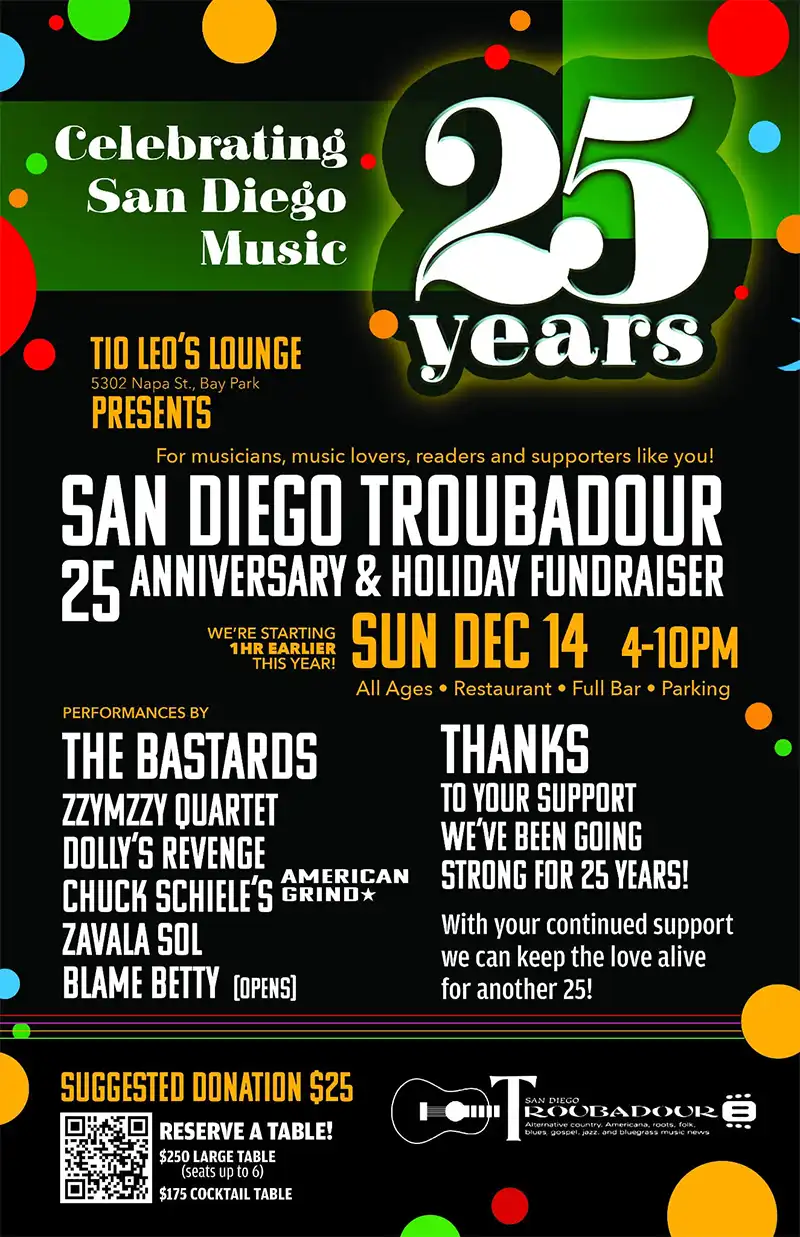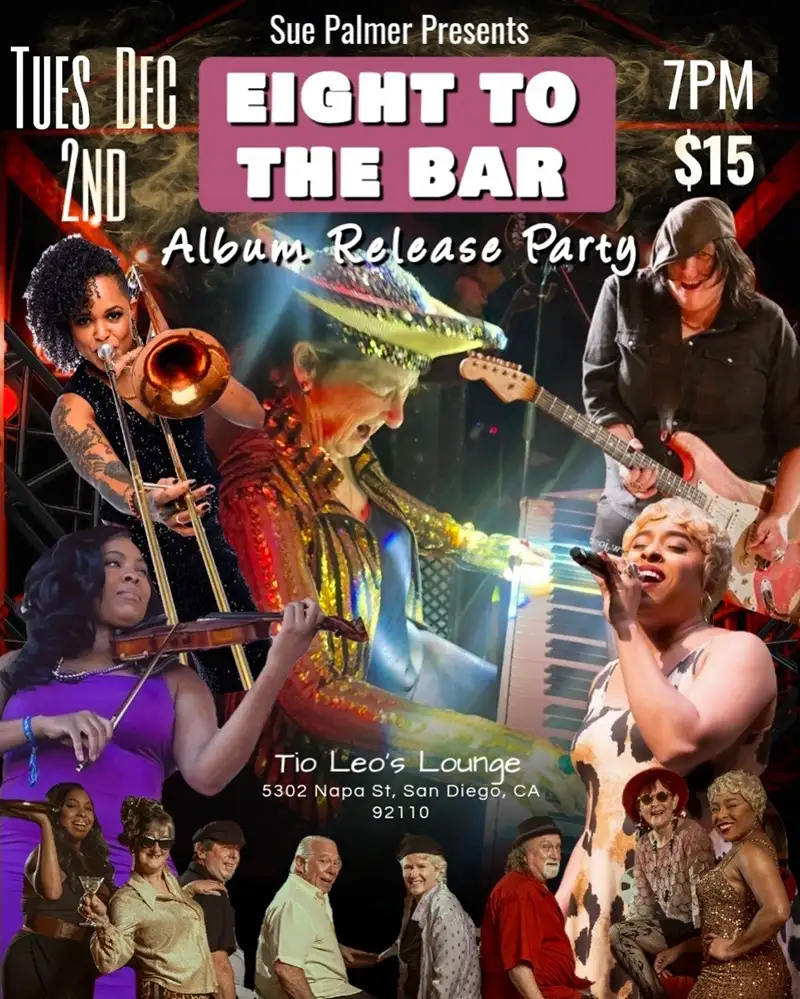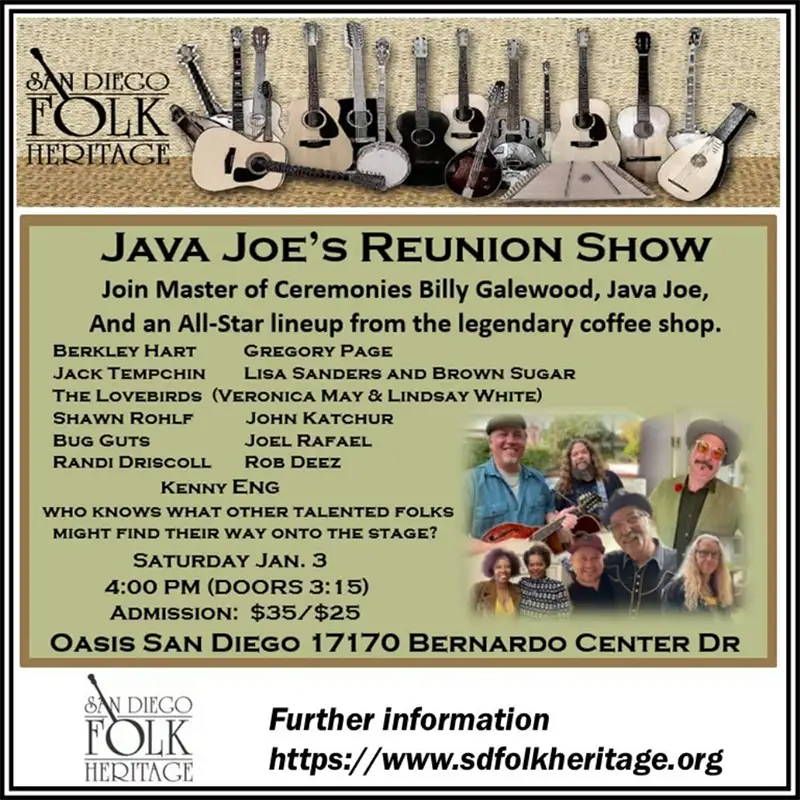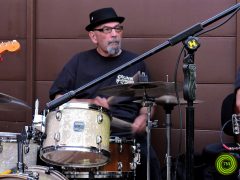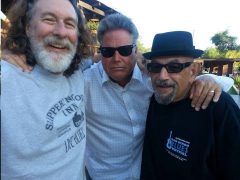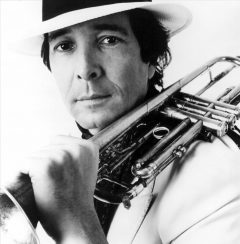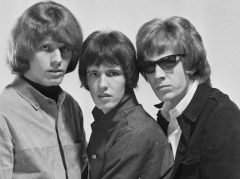Featured Stories
Drummer Al Schneider Has More than a Few Stories to Tell!
PART ONE
It’s undoubtedly a common misperception among music fans that people in “the business” exist in some rarified dimension apart from regular folk. They descend from some gated realm in the clouds to gift us with their musical creations, bestowing upon us a small taste of the delights that reside therein. Nothing could be further from the truth. Aside from the privileged few who attain wealth and celebrity status, working musicians exist alongside us in our communities, using their skills to make a living just like the rest of us. More often than not it can be a much harder road to travel than most professional career paths, but it can also be more richly rewarding, not just financially but also in life experiences. It was a wonderful surprise to be introduced to local resident Al Schneider, a drummer whose career began at the age of 14. Also known by the nicknames “Tiny” and “Big Al,” his resume includes playing with such legendary acts as the Everly Brothers, Herb Alpert, and the Walker Brothers. While somewhat soft-spoken, he is a source of great stories and insights, frequently punctuating his tales with gestures from hands that have spent a lifetime gripping drumsticks.
Interestingly, on a rainy Monday morning at Lestat’s he was eager to open the conversation by speaking at length about his experience during a long, involuntary hiatus from music. Without a trace of rancor or regret, he shares that the advent of the Urban Cowboy craze in Los Angeles seemed to coincide with a sharp drop in jobs for musicians. “This was about 1971 after my stint with the Everly Brothers. I had a wife and kid at the time and I wasn’t making any money. So, I got a job in a Denny’s restaurant as a host. You gotta realize that six to eight months before that I was with the Everlys in Johannesburg, South Africa, sitting outside at a sidewalk cafe drinking German Riesling wine and eating cheese. Then six months to a year later I was working at Denny’s as a host. It humbles you! But I had to do something because I had people to support. I felt comfortable at Denny’s because when a musician’s on the road the place is basically open 24 hours. So you go there to read your mail, read your books, pay your bills, eat your meals… I felt very comfortable. It was like my living room!
“Coming from what I did to wrapping children’s trays with crayons and coloring books and plastic knives and forks from 11 at night to 5 in the morning. The basic wage at that time was $2.50 an hour. But the money was coming in and I could support my family.” Using interpersonal skills and insights he gained while on the road playing music, Schneider was able to advance fairly quickly in the restaurant business. “You can’t control people but you can handle them. So, I became a manager within six months. I went to school at Denny’s. They taught me the restaurant business, spreadsheets, the whole nine yards. I stayed in the business for 20 years. Being in bands teaches you how to work as a cohesive unit. A restaurant crew has to do the same thing! I mean, your cook, your host, your servers, your dishwashers… if one little part is out of line everything’s messed up. When they seat you, what message is it giving you? They are ready for you. Well, if they’re not, you sit there and you wait and you get upset. These managers were trying to control their people and, like I said, you can handle people. A bandleader handles the musicians because everybody’s different. You’ve got different personalities, different talents.”
Schneider takes obvious pride in his many years in the restaurant business. It’s a clear sign that he knows the value of hard, honest work. After being laid off at the age of 60, he worked one more job as a maitre d’ while supplementing his income as an extra in movies and television. “I used to be in things like ER and The West Wing as a character actor. I played a rabbi on ER. I’d always be in the background in my long coat and my hat and I would be making gestures like you’re praying.” And pray he did, because the desire to play music was always with him. He was already an adult by the time he had his Bar Mitzvah, so he was spiritually prepared to make the necessary leap of faith to answer his muse. “It was tearing me apart. I had to play. I just turned it over to God. If everything I learned was true and on the straight and narrow, I’d be fine. If it was wrong, I was screwed because I quit my last restaurant job without anything to go to—without any plans except for this extras stuff. I tried to stay in the moment and make the best decisions I could. Sometimes you don’t even know why until a long time later when it hits you. As it turned out I made the right choice.”
But the seeds of that choice had been sown many years before, as he was inexorably guided to his life’s work. “I was born in Chicago in 1941. Just like the blues song. I didn’t start playing music until we moved out to California when I was 13. That’s where my Bar Mitzvah money went. My folks had to use it to move out here!” Exactly where his musical aptitude came from is uncertain. He had an aunt Allegra who was an opera singer. “She had a voice that was just killer. But I don’t know if that was an influence or not because she was the only one in the family that had any musical ability at all.” Yet, he also notes that his mother learned piano without benefit of lessons, singling out Chopin’s Polonaise as a piece she was able to play by ear. “We always had music in the house. She loved Broadway shows. She loved a lot of the old music.” And, more important, she was supportive of his burgeoning interest in music. “When we came out here I started at Will Rogers Junior High School in Lawndale. They sent a note home that said ‘would you like your child to be involved in music classes?’ My mother said, ‘of course!’ I went back to the band teacher in junior high school and I had made up my mind that I wanted to play the trombone. Well, I went up to him and he said, ‘What is your choice?’ and I said, ‘I want to play trombone’. He reaches down and says to me, ‘We’re out of trombones. Take these drumsticks and go in the back. You’re a drummer.’ And within about six months I was playing on a snare drum with brushes in the teachers’ band. They would play Dixieland tunes and I guess I was the only guy who could at least keep time. They were still doing big band stuff—Red Nichols and the Five Pennies, Louis Armstrong stuff. When I started working in clubs and local VFW halls, my first band was a Dixieland band. I still dearly love Dixieland. I think that’s really American music. It just has a feel to it. If you can’t tap your foot to Dixieland, you ain’t alive!” It was serendipitous that trombones were in short supply, as Schneider’s passion for playing drums took over in a big way. He reveals that when he got to high school he joined every band that he could get into, including a concert band, marching band, pep band, and dance band—“everything I could get into musically. They did productions of Rebel Without a Cause and things like that. It was kind of cool because they did a couple scenes in there where my drums were on stage. I was only 15 or 16 and all the kids would be dancing around me just to the drum beat. And boy, it was getting to me. I said, ‘I want to do this. I gotta do this for the rest of my life.’”
A rare opportunity to perform at the professional level came early. “The thing that really really tipped the scale was when I was a senior in high school. I had a band teacher named James Dean. He was a really good trumpet player. He was playing with a lot of guys up in Hollywood at the Baked Potato, doing jazz. He came to me one day and said, ‘You’re not doing anything this next weekend, are you?’ and I said, ‘No’. He said, ‘How would you like to go to San Francisco to play a gig?’ Of course I cleared it with my folks, but nowadays if a teacher asks a teenager if they want to go to San Francisco for the weekend, you’d call the cops on ‘em! I asked, ‘What for?’ and he said he’s gonna be playing trumpet with this new guy that just put a record out. The name of the record is Tijuana Taxi. The trumpet player’s name is Herb Alpert, and they’re playing the Cow Palace. That was my first experience playing in front of a crowd that big, because it was packed. The Cow Palace was just unbelievable. We played five or six tunes and it just blew me away. Now I knew what I wanted to do for the rest of my life. Everybody was cheering and it was a gas. It was absolutely incredible.
“Luckily, my mom bought me my first outfit of drums, and it was onward and upward from there—to El Camino College. Then I got a little sophisticated. We got into jazz. In Hermosa Beach there was a club called the Lighthouse. It’s still there on Pier Avenue. At that time it was exclusively jazz. That’s what we were into because we were avant garde college kids. We were hip. We didn’t want to mess around with rock ‘n’ roll or any of that stuff. Every Easter week they would have an intercollegiate jazz festival. Well, we were runner-up two years in a row. We had an eight-piece jazz group. Right next door to the Lighthouse was a place called the Hermosa Inn. When we finished playing at the Lighthouse, like on a Sunday night, the sax player would pick up his clarinet. One of our trumpet players would get a thing called a trombonium, which is not really a trombone but it sounded like one. We’d go next door and play Dixieland all night! You didn’t pace yourself. You just played.” The Lighthouse also served as a clinic for Schneider, as it provided him with a venue where he could absorb vital information from great professional players. “We could go there for the price of a Coke and sit there all night. I was there four or five times a week. There was Howard Rumsey on bass, Victor Feldman on piano and vibes, Conte Candoli on trumpet, Bob Cooper on oboe and tenor sax, and the drummer was a favorite drummer named Stan Levey, who is no longer alive. He was a left-handed drummer, so I could sit in the audience in front of him and it was like looking into a mirror. Under the table I would copy some of the things he was doing with his hands. I learned a lot from just watching Stan Levey play. One of my biggest regrets is that I never got a chance to look him up and thank him for that. That is one thing on my bucket list that will never be taken care of. But that was a trip because you could hear these top musicians for two bucks! They were the cream of the crop in LA. These were the guys that were recording all the jazz music and playing it live. It was a great time. Sandwiched between all that I was also in a surf band group called the Belairs. I was like the third-generation drummer in the Belairs. I wish I was. Richard Delvy was the originator of that group. He was the drummer and went on to establish the Challengers, which was a pretty big surf group.” Schneider notes that Delvy and Challengers’ bassist Randy Nauert went on to successful careers in the recording industry. “It was a pretty good era. Things were happening musically.
“I was just working, trying to make a living at that time. I wasn’t in college anymore. I had graduated from El Camino. I had gone to San Fernando Valley State, which is now called Cal State Northridge. I was there for about a year and I tried to take drum lessons. I never had lessons. I taught myself. I was also told that for a drummer, majoring in music is the wrong thing to do, which emboldened me even more to stay in it. So I had three drum teachers telling me ‘there’s the right way to play, there’s the wrong way to play, and there’s your way to play. As long as you’re getting the job done keep on doing what you’re doing.’ I was working at the time and playing at night. So that’s what I did, and that’s what I’ve been doing. Technically, I taught myself as much as I possibly could. I used what I could and I used what I knew. I’m not a particularly technique-based drummer.” Yet, he holds very definite views on the role of the rhythm section in a band. “You gotta keep time. You’ve just gotta lock in with the bass player. You’ve got to put that foundation down. The drummer and the bass player… we’re there to back up what’s in front of us. Contrary to popular belief, the bass is not a melody instrument and drums are not a melody instrument. Too many of those types of musicians try and play their bass or their drums like they should be on top of everything and they’re not. They’re support instruments.” When the subject of instrumental solos are broached, Schneider is equally confident when he states, “The time when the guy can show what he does is when he has a solo. But then nobody else is playing. It isn’t as if you’re covering everybody up.”
In addition to live work, Schneider has spent a fair bit of time in the studio. He considers his very first session to be the most meaningful. “I was still in high school. I still have it. It was a 78 acetate that they would make for you right on the spot. I went in there with some friends of mine and did a tune called ‘Raindrops’ that had typical ‘ice cream’ changes. It was at Gold Star Records. That was the big place to go in LA. Sonny and Cher were recording there. All the pop acts of the time were recording at Gold Star. Well, we went in there and on the first recording session I ever did, I played drums and I played piano. And I had a piano solo. That’s one of the most memorable because it was the very first one. That must have been 1956 or ’57. Later on with the Belairs he recalls, “We were trying to make another record because they had ‘Mr. Moto.’ There were a couple of guys who were still in the original band. We tried to make a follow-up to ‘Mr. Moto’ called ‘Charlie Chan.’ We figured we might as well keep it in the same genre: fictional detective Mr. Moto, fictional detective Charlie Chan! It made sense to us at the time. We got a little bit of airplay, just because it was the Belairs. I think it went up on the Billboard Top 100 at 98 but we stayed at 98 for three weeks! [laughing]” As things turned out, Schneider’s bread and butter was destined to be performing live on stage. “There were other recording sessions with other bands, but I was never able to break into the studio. You had a small, unknown group of guys who were called the Wrecking Crew, and Hal Blaine was one of my biggest influences. I even got a set of drums like Hal Blaine with the concert toms—eight of them going all the way around. There are photos of me on my web page with those drums. When Hal Blaine passed away they had pictures of his drums, with captions that said ‘the most recorded drum set in the world.’ Underneath his picture I put a picture of my drums at the time and I said, ‘the most un-recorded drum set in the world’!”
The blues caught Schneider’s ear early on and he fell for it in a big way. However, the opportunity to devote his talents to it would come much later. “As soon as I started hearing blues, I was a slave to it. I was young but nobody I knew at my age was playing that kind of music. As far as I’m concerned, whether it’s Muddy or Little Walter, it’s the bass that makes it happen. It’s the bass, man. It’s all about the bass. You listen to Willie Dixon playing on all those records, which is basically four on the floor type of stuff, but It’s so driving. The drums are not the real exciting thing on it unless you’re listening to Freddie Below. Freddie Below, who was Little Walter’s drummer, was basically a jazz drummer who switched over. He was playing simple blues but he still was thinking like a jazz drummer. If you listen to him you can hear the off-tempo things he does. And the rhythm patterns that he plays to support Walter on his harmonica—nobody plays like Freddie Below. He was my inspiration as far as blues drumming goes.”
It was in pop music where he would make his greatest mark. Prior to his involvement with the Everly Brothers, he played with the Walker Brothers, performing at Gazzarri’s on La Cienega, a dinner club counterpart to the famous establishment on Sunset Boulevard. “They weren’t really brothers but they looked enough alike. There was a night we were playing this club as the Walker Brothers and it just wasn’t happening. We were gonna break up. Bill Gazzarri came into the club and offered us a job that night. We started doing a TV show called Ninth Street West, which morphed into Hollywood a Go Go. We were playing there five nights a week and then working the TV show. We had lines around the block! I mean it was heaven. The Walker Brothers stepped on too many toes. Bill Gazzarri had some pretty powerful friends. From Miami, from Chicago…you know what I’m saying. The Walker Brothers signed too many contracts when they were underage. So they’re kind of getting the cold shoulder all around. They decided to go to England on spec. The guy that offered them the deal to go to England had one caveat: they had to use his kid to play drums. I’ve always understood it business-wise, but to this day it hurts because I just got left in the lurch. They went to England on spec without anything concrete but they had to take Gary Leeds, who was kind of more like them anyway. Tall, skinny, and could wear Spandex pants. I mean, when I got between the two Everly Brothers they were both six feet tall and skinny. It looked like the number 101! For a three-year period there were three groups in England that were at the top: the Beatles, the Stones, and the Walker Brothers. There was a guy named Stephen McPartland who got in touch with me years ago. He’s an author from Australia and he was writing a book called The All-American Boys, which is all about the Walker Brothers while they were in LA up until the time they left for England. He was looking for me for three years, because I knew things that happened during that time, which nobody knew! He told me, ‘People you know have given you a title: America’s version of Pete Best.’ And that’s in print. You’re the American version of Pete Best, which means you got screwed. I mean, I was that close to it. Pete Best… once he left the band, what happened? The Beatles had a hit! He still has his own band and he’s still living off of being the former drummer. And why not? Give him a little credit. He was an integral part of that band that got those guys to a certain point. So I said, ‘That kind of feels good and yet it doesn’t feel good.’”
Bigger things were looming on the horizon, although the route toward them was going to be circuitous. “I was playing a club called the Tomcat in Torrance in about 1968. Guys used to come in to make special appearances and the house band would back them up. There would be a name guy who had a record. There was this one guy who used to play bass for the Everly Brothers. His name was Joey Paige. He was real friendly with the Stones and all these guys. Joey had been booked to come into the club and do two shows and a couple of his friends came down to see him: Sam McCue who was the guitar player for the Everly Brothers at the time and the road manager whose name was Don Wayne. We backed up Joey and they came into the dressing room and said, ‘Look, man, we want to talk to you.’ They sat me down and they asked, ‘How would you like to play drums for the Everly Brothers?’ And I said, ‘Yeah, right.’ How would you like to go five rounds with Muhammad Ali or Joe Louis, or whatever?’ And they said, ‘No, seriously.’ They gave me a phone number, I gave them my phone number, and they said, ‘We’re gonna call you soon. The drummer that we have isn’t working out. We’re gonna get rid of him. Be ready to go.’ Yeah…I was on Cloud Nine!”
Stay tuned for part two next month, where Al talks about his time drumming for the Everly Brothers.


